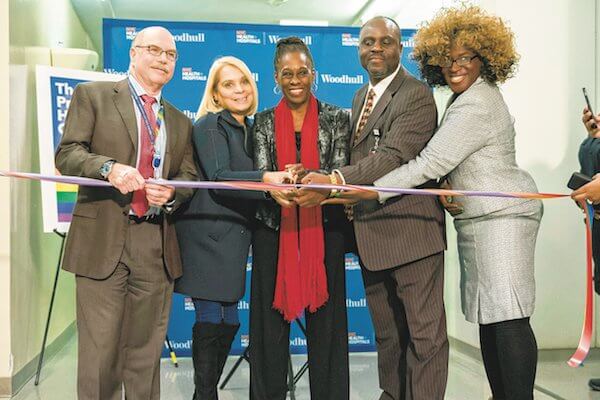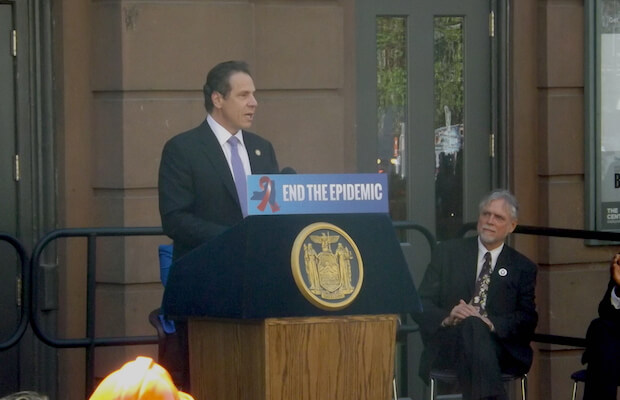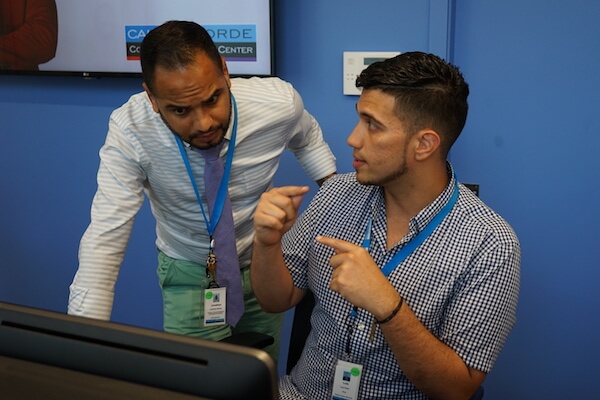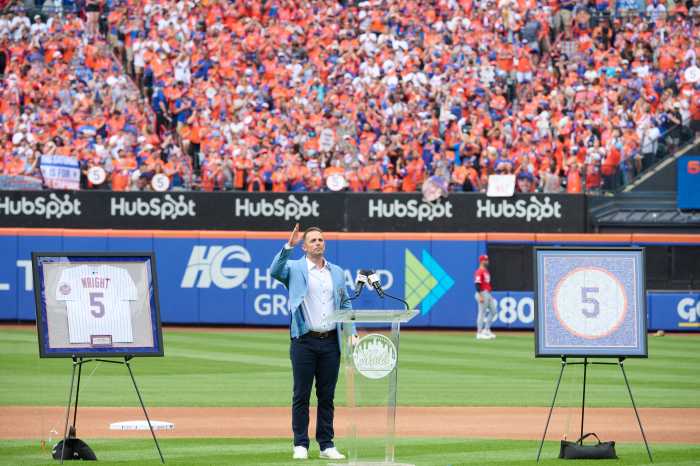At the March 15 official reopening of the city’s Chelsea sexual health clinic, Dr. Mary T. Bassett, the health commissioner speaks, flanked by City Councilmember Mark Levine, Council Speaker Corey Johnson, Ana Barrio, acting commissioner of the city's Department of Design and Construction, and Matthew McMorrow, an aide to Mayor Bill de Blasio. | DUNCAN OSBORNE
Three years after its planned closing sparked outrage and protests among AIDS activists, the renovation of the city’s Chelsea sexual health clinic is largely completed and the clinic has been seeing patients since March 5.
“I want to give credit to the important alliance between the advocates and the people who work in government,” Dr. Mary T. Bassett, the city’s health commissioner, said during the March 15 official reopening of the clinic, which is located at 303 Ninth Avenue between 27th and 28th Streets. “I would like to thank the many advocates who have pushed us to make this the very best clinic it can be.”
The clinic was the busiest among the nine health clinics operated by the city. AIDS groups had anticipated that it would play a central role in the Plan to End AIDS, which is an ambitious undertaking to reduce the number of annual new HIV infections in New York State from the estimated 2,481 in 2014 to 750 a year by 2020.
Furor stirred by its renovation led officials to reach out for advocates’ input
With most new HIV infections in New York occurring in New York City, the city has set its own goal as part of the plan of getting down to 600 new HIV infections a year by 2020.
The plan relies on treating HIV-positive people with anti-HIV drugs so they remain healthy and cannot infect others. For those who need it, the plan also delivers housing, nutrition, and other services so people can stay on their anti-HIV drugs.
HIV-negative people are offered pre-exposure prophylaxis (PrEP) and post-exposure prophylaxis (PEP). Both regimes use anti-HIV drugs in people to keep them from becoming infected. The clinics are an obvious place to identify large numbers of people who are newly HIV-infected and get them on anti-HIV drugs as well as to identify large numbers of people who are having sex that may expose them to HIV and get them on to PrEP or PEP.
In 2014, the Chelsea clinic had 19,243 visits, or 23 percent of the 83,000 visits to all the clinics that year. The next highest total was reported by the Fort Greene clinic, which had 12,472 visits, or 15 percent of the 2014 visits.
Joining in the ribbon cutting are Housing Works CEO Charles King, Levine, Barrio, Dr. Sue Blank, the city’s assistant commissioner for sexually transmitted disease control, Bassett, Dr. Demetre Daskalakis, the city’s deputy commissioner for disease control, TAG's Jeremiah Johnson, Dr. Eunmee Chun, director of sexual health at the Callen-Lorde Community Health Center, Dr. Freddy Molano, vice president of Infectious Diseases and LGBTQ Programs at the Community Healthcare Network, and McMorrow. | DUNCAN OSBORNE
In a 2015 letter following the Chelsea clinic’s closing, the Treatment Action Group (TAG), Housing Works, Harlem United, Gay Men’s Health Crisis, VOCAL-NY, ACT UP/ NY, and Ginny Shubert, a leading housing and healthcare consultant, wrote to Mayor Bill de Blasio asking that the services lost with the closing be replaced.
“This action poses an immediate and severe threat to the public health of the City, not only to Chelsea residents, but to all of New York City’s lesbian, gay, bisexual, and transgender (LGBT) communities,” the groups wrote. “This action, if not immediately remedied… will undoubtedly result in excess HIV and other [sexually transmitted disease] infections.”
Charles King, the chief executive at Housing Works, and Mark Harrington, TAG’s executive director, are credited with conceiving of the Plan to End AIDS and King in particular has been a leading proponent of the plan.
Corey Johnson of Chelsea, who was the chair of the City Council’s Health Committee in 2015 and is now the City Council speaker, took a lead role in getting the city health department and the AIDS activists to come to an agreement on how to replace the lost services.
“It’s beautiful,” Johnson said as he toured the clinic prior to the March 15 press conference. “I wish there were before and after photos because it was scary.”
The official opening was a reconciliation of sorts. While activists did not dispute that the Chelsea clinic, which first opened in 1937, was in need of the renovation, they remained unhappy with how the closing was handled.
“We neglected to consult with the community and this was not a good idea,” said Dr. Sue Blank, the assistant commissioner who oversees sexually transmitted disease control at the city health department, at the March 15 event. “Boy, did you let us know it.”
King and TAG’s Jeremiah Johnson both spoke at the opening ceremony and praised the new clinic and the city health department. Ana Barrio, the acting commissioner of the city’s Department of Design and Construction, which oversaw the renovation, also won praise from advocates.
Also speaking at the event were Upper West Side City Councilmember Mark Levine, the new chair of the Health Committee, Dr. Eunmee Chun, the director of sexual health at the Callen-Lorde Community Health Center, which added 105 sexual health visits to its weekly schedule when the Chelsea clinic closed, and Dr. Freddy Molano, vice president of Infectious Diseases and LGBTQ Programs at the Community Healthcare Network.
The clinic has the capacity to handle up to 200 visits a day. The clinic saw 50 people on March 5 and to date has put 21 people on PrEP. Bassett said the city health department was promoting the renovated Chelsea clinic on social media and by word of mouth.
“We’re going to be sending it out on social media,” she said. “There’s nothing more powerful than word of mouth.”




































